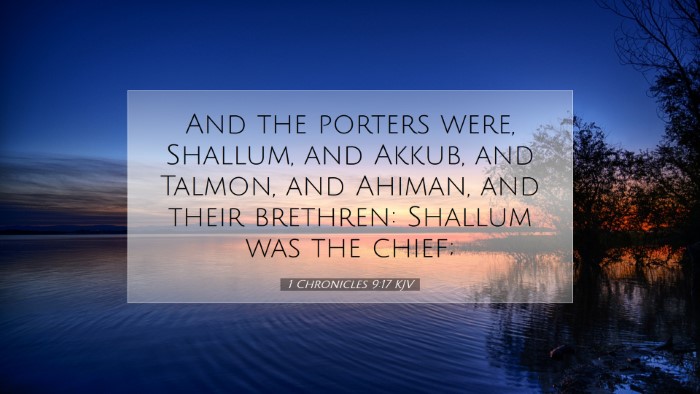Commentary on 1 Chronicles 9:17
Verse Context: 1 Chronicles 9:17 states, "And the porters were, Shallum, and Akkub, and Talmon, and Ahiman, and their brethren: Shallum was the chief." This verse is part of a broader narrative about the returning exiles and the organization of the Temple services, particularly the role of the porters (or gatekeepers).
Introduction
This passage highlights the importance of order and structure within the worship life of Israel. The role of the porters was critical as they served as gatekeepers to the sacred places, ensuring that the holiness of the Temple was upheld and that only those who were permitted could enter.
The Nature of the Porters’ Duty
Earlier commentaries emphasize the vital role that the porters played in maintaining both physical and spiritual sanctity. They were not only responsible for the gates of the Temple but also had the duty of supervising the entry of the people and overseeing various functions associated with the sacred space.
- Matthew Henry's Commentary: Henry elaborates on the porters as "the keepers of the gates" who were chosen from the Levites. Their duty involved being vigilant and dedicated, reflecting the believers' need for diligence in spiritual matters.
- Albert Barnes: Barnes indicates that the porters' role illustrates God's order in worship. He affirms that these positions were essential for managing the influx of worshippers and maintaining the sanctity of the entrance to God's dwelling.
- Adam Clarke: Clarke notes that the porters were not only gatekeepers but also guardians of the worship activities. Their responsibility was deeply intertwined with the physical security of the Temple as well as the spiritual integrity of worship.
Tribe of Levi and the Role of the Porters
In the context of the Levitical duties, the porters held a significant position. As members of the priestly tribe, their responsibilities were not to be taken lightly.
- The Levites were consecrated for service in the Tabernacle and later the Temple. The porters were primarily responsible for the physical structure and, by extension, spiritual security.
- Henry emphasizes their duty as a service unto the Lord, serving as a reminder that all aspects of worship must be dedicated to God.
The Significance of Naming in the Context
The mention of specific names—Shallum, Akkub, Talmon, Ahiman—carries weight in biblical literature. These names signify not only individuals but also the continuation of a legacy and the faithfulness of generations.
- Cultural Context: In the ancient Near East, names were of paramount importance and often reflected character or destiny. Their inclusion suggests an acknowledgment of the individuals who served in these important roles.
- Spiritual Legacy: Barnes points out that these names linked a physical group of people with a spiritual mission, reminding the congregants of the historical covenant between God and Israel.
Leadership and Structure in Worship
The role of Shallum as chief of the porters denotes a structured leadership within the Temple services. Leadership within the covenant community is crucial for proper worship and functioning.
- Matthew Henry: Emphasizes the significance of leadership, indicating that good organization reflects God's order in Creation.
- Adam Clarke: Connects the efficient service of the porters to the broader theme of God’s governance over His people, asserting that leadership must be aligned with divine purpose.
Application for Modern Believers
This verse, while historical, offers timeless applications for modern believers, particularly those in ministry.
- Service: The dedication of the porters models a spirit of service in ministry. Believers today are encouraged to serve in various capacities, reflecting their commitment to God and the community.
- Sanctity of Worship: The gatekeeper role urges contemporary worship leaders to prioritize the sanctity and order of their worship environments.
- Community and Legacy: The passage prompts reflection on the legacy being passed on to future generations within the church, emphasizing the importance of both individual and collective faithfulness.
Conclusion
1 Chronicles 9:17 serves as an important reminder of the structured nature of worship as ordained by God. Through their faithfulness, the porters underscore the theme of stewardship and service in maintaining God's holiness among His people. All believers, by following their example, can contribute to a vibrant, orderly, and reverent worship experience that glorifies God.


